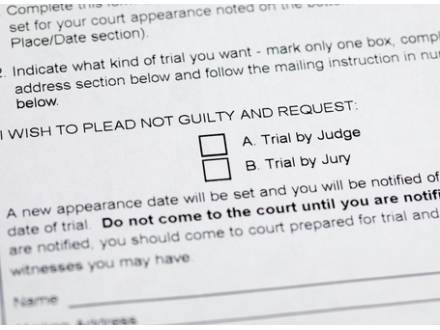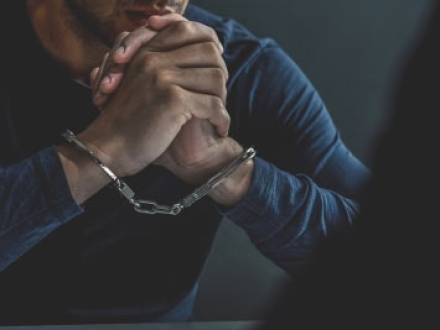Recent Blog Posts
Is Removing a Wisconsin GPS Bracelet a Felony Offense?
 The Sturgeon Bay, WI Police Department is currently searching for a sex offender who removed his GPS bracelet while on parole. The man was convicted of sexual assault in 1999. As a part of his parole conditions, he was required to be on the Wisconsin Sex Offender Registry and wear a GPS bracelet.
The Sturgeon Bay, WI Police Department is currently searching for a sex offender who removed his GPS bracelet while on parole. The man was convicted of sexual assault in 1999. As a part of his parole conditions, he was required to be on the Wisconsin Sex Offender Registry and wear a GPS bracelet.
The suspect has a prior charge of tampering with a GPS device from 2020 that added three years to the length of his probation. Tampering with a GPS device is a serious offense with serious penalties that require a highly experienced criminal defense. If you are facing this charge or another criminal defense charge, it is important that you speak to a Walworth County, WI criminal defense attorney.
How is Tampering with a GPS Device Charged and Punished?
Tampering with a GPS device is a Class I felony offense that can result in up to three and a half years in prison. The statute includes refusing a GPS device as well as tampering with or removing a device. Any person who does not have authorization from the Wisconsin Department of Corrections who knowingly refuses, obstructs, resists, tampers with, blocks, prevents the clear reception of, or removes a GPS device is subject to these penalties.
Fewer WI Disorderly Conduct and Marijuana Charges in 2025?
 A Wisconsin proposal that has formerly been rejected multiple times has been reintroduced. This proposal, if passed, could decrease criminal charges across the state. The public defender’s office proposes amending state laws to do away with state criminal charges for the possession of marijuana and limit the definition of criminal disorderly conduct.
A Wisconsin proposal that has formerly been rejected multiple times has been reintroduced. This proposal, if passed, could decrease criminal charges across the state. The public defender’s office proposes amending state laws to do away with state criminal charges for the possession of marijuana and limit the definition of criminal disorderly conduct.
In 2023, disorderly conduct charges were filed more frequently than any other criminal charge (27,500 cases). A lobbyist claims the charge of disorderly conduct is a "catch-all," often used when how to charge a criminal offense is not clear. Currently, disorderly conduct in the state includes any type of "indecent, profane, boisterous, or unreasonably loud" behavior.
The new proposal would allow disorderly conduct and marijuana possession to be filed as civil offenses rather than criminal offenses. Some believe these changes will reduce caseloads and save the public defender’s office a considerable amount of time and money.
Have You Been Designated as a Habitual Traffic Offender?
 The first speeding ticket was issued in 1899 when a driver in downtown Manhattan was caught driving 12 mph in an 8-mph zone. Speeding tickets are, by far, the most commonly received traffic ticket across the United States, with about 11 percent of all adult drivers receiving at least one speeding ticket. A speeding ticket not only costs an average of $150 but can increase auto insurance rates by as much as 25 percent.
The first speeding ticket was issued in 1899 when a driver in downtown Manhattan was caught driving 12 mph in an 8-mph zone. Speeding tickets are, by far, the most commonly received traffic ticket across the United States, with about 11 percent of all adult drivers receiving at least one speeding ticket. A speeding ticket not only costs an average of $150 but can increase auto insurance rates by as much as 25 percent.
Traffic tickets are the most common way most Americans interact with law enforcement. Out of the nearly 200 million licensed drivers in the United States, about one out of every five will receive a traffic ticket within any given year. Wisconsin Rules of the Road statute gives drivers a good idea of which driving behaviors in the state could result in a traffic citation.
Defending Intentional Homicide Charges in Wisconsin
 A 38-year-old Friendship, WI man was recently arrested under suspicion of committing a double homicide in the state. The man has been charged with two counts of intentional homicide and two counts of hiding a corpse. Intentional homicide charges are among the most severe charges in the state.
A 38-year-old Friendship, WI man was recently arrested under suspicion of committing a double homicide in the state. The man has been charged with two counts of intentional homicide and two counts of hiding a corpse. Intentional homicide charges are among the most severe charges in the state.
A conviction for intentional homicide brings severe penalties that can potentially last a lifetime. If you have been charged with intentional homicide or any type of murder charge in Wisconsin, it is extremely important that you speak to a Dodge County, WI criminal defense attorney with significant experience in defending such serious charges.
What Are the Different Types of Murder Charges in Wisconsin?
The different types of murder in the state include the following:
16-Year-Old Student Arrested for Bringing Gun to School
 A Kenosha, WI high school student was recently arrested after allegedly bringing a gun into his school. This is the second time in less than a month that a firearm was found in a Wisconsin school. Officials were tipped off to a photo posted on social media of a student with a gun. The student was subsequently located, arrested, and placed into custody at a juvenile detention facility. The gun was a bit harder to locate, although police did find the gun on the student at the juvenile facility where he was taken.
A Kenosha, WI high school student was recently arrested after allegedly bringing a gun into his school. This is the second time in less than a month that a firearm was found in a Wisconsin school. Officials were tipped off to a photo posted on social media of a student with a gun. The student was subsequently located, arrested, and placed into custody at a juvenile detention facility. The gun was a bit harder to locate, although police did find the gun on the student at the juvenile facility where he was taken.
Police say they missed the weapon when they searched the student at the school because it was in a "sensitive area." The teen was charged with terrorist threats, possession of a firearm on school property, and carrying a concealed weapon. Like most states, juvenile crimes in Wisconsin are different from adult criminal offenses, both in procedure and penalties.
Criminal proceedings involving minors, along with the outcomes of those procedures, are secret in the state. It can be devastating for parents when their child is charged with a criminal offense. If your child is facing criminal charges, speaking with an experienced Ozaukee County, WI juvenile crimes attorney can help make a difference in the outcome.
Woman Arrested Two Years After Crash That Killed One-Year-Old
 On January 27, 2023, the Wisconsin mother of a one-year-old child parked her unlocked vehicle at her home and went inside. She left a family friend in the car with the child, but the car and her child were gone when she came out of the house. The family friend apparently jumped into the driver’s seat and drove away with the child. She later crashed the car, killing the baby. The woman was hospitalized following the crash, fleeing law enforcement after being released. Almost two years later, the woman was taken into custody in Milwaukee on December 3rd.
On January 27, 2023, the Wisconsin mother of a one-year-old child parked her unlocked vehicle at her home and went inside. She left a family friend in the car with the child, but the car and her child were gone when she came out of the house. The family friend apparently jumped into the driver’s seat and drove away with the child. She later crashed the car, killing the baby. The woman was hospitalized following the crash, fleeing law enforcement after being released. Almost two years later, the woman was taken into custody in Milwaukee on December 3rd.
The specific charges against the woman are unclear; in the state of Wisconsin, homicide is a broad category, including felony murder, first-degree intentional homicide, second-degree intentional homicide, reckless homicide, negligent homicide, homicide by negligent use of a motor vehicle, homicide by negligent use of a firearm, and homicide by negligent control of a vicious animal. In this particular instance, the charges are likely to be homicide by negligent use of a motor vehicle, although additional charges or enhancements could be added because the woman fled.
Wisconsin Police Crack Down on Street Takeovers
 Street takeovers are a dangerous new nationwide trend where a group of drivers and onlookers gather to perform dangerous stunts or engage in street racing. These gatherings take place on public streets or spaces and can put everyone in the area at risk. While most of these events take place in the warmer months, winter street racing events are especially deadly due to the increased risk of a driver losing control in the ice and snow. Madison, WI police recently cited about 80 drivers in a massive street takeover that took place at the East Town Mall. Other police departments have taken notice and are starting to crack down on these illegal events and the many traffic offenses they involve. If you have been charged with a traffic crime related to a street takeover event, you need a well-qualified Milwaukee County, WI traffic offenses attorney to help you. The penalties can be serious and range from a $20 fine to years in prison if someone is killed as a result.
Street takeovers are a dangerous new nationwide trend where a group of drivers and onlookers gather to perform dangerous stunts or engage in street racing. These gatherings take place on public streets or spaces and can put everyone in the area at risk. While most of these events take place in the warmer months, winter street racing events are especially deadly due to the increased risk of a driver losing control in the ice and snow. Madison, WI police recently cited about 80 drivers in a massive street takeover that took place at the East Town Mall. Other police departments have taken notice and are starting to crack down on these illegal events and the many traffic offenses they involve. If you have been charged with a traffic crime related to a street takeover event, you need a well-qualified Milwaukee County, WI traffic offenses attorney to help you. The penalties can be serious and range from a $20 fine to years in prison if someone is killed as a result.
Reckless Driving Charges Explained
 Reckless driving is something of a catch-all traffic charge for operating a vehicle in any way that endangers people or property. It is less serious than a DUI but more serious than a speeding ticket. Reckless driving is a misdemeanor crime, not a minor traffic violation. If someone actually did get hurt as a result of your reckless driving, you could even be sent to jail. However, a first-offense reckless driving charge that did not result in any injuries does not carry jail time. The penalties get much more serious with repeat offenses or injuries to others, including your own passengers. If you have been charged with reckless driving, you should reach out to a well-qualified Walworth County, WI traffic crimes attorney.
Reckless driving is something of a catch-all traffic charge for operating a vehicle in any way that endangers people or property. It is less serious than a DUI but more serious than a speeding ticket. Reckless driving is a misdemeanor crime, not a minor traffic violation. If someone actually did get hurt as a result of your reckless driving, you could even be sent to jail. However, a first-offense reckless driving charge that did not result in any injuries does not carry jail time. The penalties get much more serious with repeat offenses or injuries to others, including your own passengers. If you have been charged with reckless driving, you should reach out to a well-qualified Walworth County, WI traffic crimes attorney.
What is Reckless Driving?
The crime of reckless driving covers a wide variety of conduct that puts other people or property around you at risk. Reckless driving might include:
How to Prepare for Sexual Assault Charges
 Learning that you have been accused of sexual assault can be horrifying. As soon as you are aware that an accusation has been made, it is best to start preparing for the possibility that criminal charges will be filed. Do not assume that the person who has accused you is only attacking your reputation and will not go to the police. Several days or weeks can pass between the time someone reports a sexual assault and the time an arrest is made. If you learn that you have been accused of sexual assault, you urgently need to speak with an experienced Waukesha, WI sex crime attorney so that you can begin preparing to defend a criminal case.
Learning that you have been accused of sexual assault can be horrifying. As soon as you are aware that an accusation has been made, it is best to start preparing for the possibility that criminal charges will be filed. Do not assume that the person who has accused you is only attacking your reputation and will not go to the police. Several days or weeks can pass between the time someone reports a sexual assault and the time an arrest is made. If you learn that you have been accused of sexual assault, you urgently need to speak with an experienced Waukesha, WI sex crime attorney so that you can begin preparing to defend a criminal case.
Avoid Making Public Statements About the Accusation
Your initial reaction might be to publicly defend yourself against the rape accusations. It can be very tempting to make a Facebook post proclaiming your innocence or even to talk to the media if there has been any publicity. However, it is generally inadvisable to make any public statements regarding the sexual assault you have been accused of.
OWI Crash in Wisconsin Leaves One Person Dead
 One person died in a car crash in Franklin, WI, on November 2nd, near Lovers Lane Road and Rawson Avenue. Police have determined that the collision was caused by an intoxicated driver, who has been arrested. It is expected that the man will be charged with homicide by intoxicated use of a vehicle and potentially other OWI charges as well.
One person died in a car crash in Franklin, WI, on November 2nd, near Lovers Lane Road and Rawson Avenue. Police have determined that the collision was caused by an intoxicated driver, who has been arrested. It is expected that the man will be charged with homicide by intoxicated use of a vehicle and potentially other OWI charges as well.
The deceased was a 74-year-old man who was pronounced dead at the scene. The driver of the other vehicle had minor injuries, which were treated before he was arrested and booked. If you have been charged with homicide by intoxicated use of a vehicle or any other type of OWI charges, it can benefit you to speak to a Menomonee Falls, WI OWI lawyer from Bucher Law Group, LLC.
What is the Difference Between OWI and DUI in Wisconsin?
OWI in the state of Wisconsin means operating a vehicle while intoxicated or driving while drunk. DUI stands for driving under the influence, which could include the influence of drugs, both prescription and illegal. Prosecutors and police in the state felt that people were getting away with drunk driving because of the "D" in DUI, which stands for driving.














 262-303-4916
262-303-4916 262-303-4079
262-303-4079






